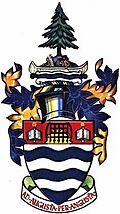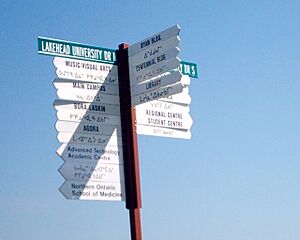Lakehead University facts for kids
 |
|
| Motto | Ad augusta per angusta |
|---|---|
|
Motto in English
|
Achievement through effort |
| Type | Public university |
| Established | Lakehead University 1965; Lakehead Technical Institute 1946 |
|
Academic affiliations
|
COU, CUSID, UArctic, Universities Canada |
| Endowment | $31.14 million |
| Chancellor | Rita Deverell |
| President | Dr. Gillian Siddall |
| Provost | Dr. David Barnett |
|
Academic staff
|
319 (full time) |
|
Administrative staff
|
2,250 |
| Students | 6,729 (2017) |
| Undergraduates | 5,838 (2017) |
| Postgraduates | 891 (2017) |
| Location |
,
Canada
48°25′17″N 89°15′38″W / 48.42139°N 89.26056°W |
| Campus | Rural/suburban |
| Colours | Cobalt & blaze |
| Nickname | Lakehead Thunderwolves |
| Mascot | The Thunderwolf |
 |
|
Lakehead University is a public research university in Ontario, Canada. It has two main locations: one in Thunder Bay and another in Orillia. Lakehead University, often called 'Lakehead U', is a public school supported by the province. It offers many different programs for students, including undergraduate (first degrees) and graduate (advanced degrees). It also has a special law school and a business school that is recognized internationally. Plus, it's home to a part of the Northern Ontario School of Medicine.
More than 45,000 people have graduated from Lakehead University. The main campus in Thunder Bay has about 7,900 students. The campus in Orillia, which is about 150 kilometers north of Toronto, opened a permanent extension in 2006 and now has about 1,400 students.
Contents
Discover Lakehead University's History
Lakehead University started out as two different schools: Lakehead Technical Institute and Lakehead College of Arts, Science, and Technology.
How Lakehead Technical Institute Began
The Lakehead Technical Institute was created because people in northwestern Ontario needed a place for higher education. It officially started on June 4, 1946. Classes began in January 1948 in temporary buildings in Port Arthur. Later that year, the first university-level courses were added.
Becoming Lakehead College
The Lakehead College of Arts, Science and Technology was formed on August 1, 1957. Over time, this college was given permission to create new departments and offer university degrees in arts and sciences.
When Lakehead Became a University
The law that officially made it Lakehead University was approved on June 22, 1965. This law came into effect on July 1, 1965. The school then became known as "Lakehead University." The very first degrees were given out on May 5, 1965. Senator Norman McLeod Paterson was the first leader of the university.
Explore Lakehead University Campuses
Thunder Bay Campus Features
The original school site in south-west Port Arthur, Ontario was about 32 hectares (about 79 acres). From 1962 to 1965, more land was bought for future growth. The first building opened in 1957.
In 2005, the Northern Ontario School of Medicine (NOSM) was created. This was a joint effort between Lakehead University and Laurentian University in Sudbury. It works as part of the medical faculties at both universities. The medical school has many teaching and research locations across Northern Ontario. Students can choose to attend either the Lakehead or Laurentian campus. NOSM is special because it's the only Canadian medical school set up as its own non-profit organization.
A new law school also opened, welcoming its first students in 2013. This school is located in the old Port Arthur Collegiate Institute building. In 2014, it was named the Bora Laskin Faculty of Law. This name honors Bora Laskin, who was a very important judge in Canada.
Today, Lakehead University's Thunder Bay campus has 39 buildings and covers 116 hectares (about 287 acres) of land.
Orillia Campus Highlights
Lakehead University opened a campus in Downtown Orillia in 2006. In its first semester, about 100 students attended.
In September 2010, the university moved to a new location at 500 University Avenue. A new academic building there is the first step in creating Canada's first university campus to earn a Leadership in Energy and Environmental Design (LEED) Platinum rating. This means it's super eco-friendly! A student residence with 271 beds and a cafeteria/bookstore opened in November 2012. Lakehead Orillia now has over 1,200 students. Undergraduate programs are at the University Avenue site, while education programs are at the downtown campus.
Student Residence Life
Lakehead offers different types of student housing: residence halls, apartments, and townhouses. The Thunder Bay residence has 1,196 beds and three dining halls. Students can choose meal plans or rooms with kitchens.
The first men's residence opened in 1962 and has grown into a village of 10 buildings. This village is right by the McIntyre River, just a five-minute walk from all university buildings and sports facilities.
From 1989 to 1992, more townhouses were added, including some for students with disabilities.
A 271-bed residence in Orillia opened in late 2012. It offers two meal plan options for students.
Agricultural Research Station
The university also has a research station near Thunder Bay. Here, they test new types of crops. The university officially took over the station in 2018.
Academic Programs and Support
| University rankings | |
|---|---|
| Global rankings | |
| ARWU World | 901-1000 |
| Times World | 801–1000 |
| U.S News & World Report Global | 1291 |
| Canadian rankings | |
| Times National | 28–30 |
| U.S News & World Report National | 30 |
| Maclean's Undergrad | 10 |
The university has nine main areas of study, called faculties:
- Business Administration
- Education
- Engineering
- Natural Resources Management
- Health and Behavioral Sciences
- Science and Environmental Studies
- Social Sciences and Humanities
- Medicine
- Law (which started in September 2013)
The Social Sciences & Humanities faculty is the largest, with about 30% of the students. Other big faculties include Health and Behavioral Sciences, Science & Environmental Studies, Engineering, Education, and Business Administration. Smaller faculties are Natural Resources Management and Medicine.
Support for Indigenous Students

Lakehead University has one of the largest communities of Indigenous students in Canada. The university has special councils and policies to support them. There's also an Office of Aboriginal Initiatives.
Lakehead offers special first-year programs to help Indigenous students get started. Tutoring services are available through programs like the Native Nursing Access Program. The Superior Science Program also reaches out to remote Indigenous communities. Lakehead is unique because it has Canada's only Department of Aboriginal Education. This department helps teach Native Languages and prepares teachers to work with Indigenous students and communities.
Scholarships and Financial Aid
Lakehead University offers scholarships and bursaries (money that doesn't have to be paid back) for Aboriginal, First Nations, and Métis students. Some examples include the Hamlin Family Fund Nursing Bursaries and the Lakehead University Native Award.
The university also gives entrance scholarships to high school students who have marks above 80%. These scholarships are paid out over four years of their studies. If a student has a 95% average or higher, Lakehead even offers free tuition!
Student Life and Activities
| Undergraduate | Graduate | |
|---|---|---|
| Male | 44.3% | 41.8% |
| Female | 55.7% | 58.2% |
| Canadian student | 95.6% | 71.7% |
| International student | 4.4% | 28.3% |
The Lakehead University Student Union, or LUSU, helps manage all the student-run clubs. Students can join many different clubs, from student government to cultural groups and sports teams. LUSU also publishes The Argus, which is the student newspaper. They also run The Study Coffeehouse and The Outpost Pub, which are popular spots for campus events and performances.
University Athletics and Sports
Lakehead's Thunder Bay campus has two main sports buildings: the Fieldhouse and the Hangar. The Fieldhouse has a gym, weight room, yoga room, a 50-meter swimming pool, and changing rooms. The Hangar has a 200-meter indoor track, a soccer field, a cardio area, an aerobics studio, and a climbing wall.
Lakehead University's sports teams are called the Lakehead Thunderwolves. They compete in the Canadian U Sports league. Varsity teams include Basketball, Cross-Country, Hockey, Nordic Skiing, Track & Field, Volleyball, and Wrestling. There are also club teams like Men's Volleyball, curling, and rowing.
Meet Notable People from Lakehead
Important Faculty Members
- Andrew Donald Booth: An early computer scientist and President of Lakehead University from 1972 to 1978.
- Kathleen Booth: Another early computer scientist who helped create the first computer assembly language.
- Christopher Mushquash: A Canada Research Chair focusing on Indigenous Mental Health and Addiction.
- Dave Siciliano: Athletic director and coach for Lakehead's men's ice hockey team from 1975 to 1980.
- Geoffrey R. Weller: A Vice-President of Lakehead University and the first President of the University of Northern British Columbia.
Famous Alumni (Graduates)
- Shandor Alphonso: An official in the National Hockey League (NHL).
- Steve Ashton: A former politician in Manitoba.
- Jan Cameron: An Australian swimmer and coach.
- Melissa Coates: A professional wrestler.
- Ronald J. Duhamel: A former Member of Parliament and Senator.
- Jim Foulds: A former politician in Ontario.
- Patty Hajdu: A Member of Parliament and Minister.
- Bruce Hyer: A former Member of Parliament.
- Anthony LeBlanc: A sports executive and former president of the Arizona Coyotes hockey team.
- Stephen Low: An IMAX filmmaker and director.
- Kathleen Lynch: President of Confederation College.
- Eric Melillo: A Canadian Member of Parliament who was elected at age 21.
- Dusty Miller: The first female mayor of Thunder Bay.
- Lyn McLeod: A Canadian politician and former leader of the Ontario Liberal Party.
- Roy Piovesana: An archivist, historian, musician, and teacher.
- Gary Polonsky: The founding President of the University of Ontario Institute of Technology.
- Michael Rapino: CEO of Live Nation Entertainment, which owns Ticketmaster.
- Diane Schoemperlen: A novelist.
- David Shannon: A Canadian activist, lawyer, politician, and author.
- Dave Siciliano: An ice hockey coach and player.
- Jamie Sokalsky: Former President and CEO of Barrick Gold.
- Don Talbot: An Australian swimming coach.
- Denis Turcotte: President & CEO of Algoma Steel.
- Dr. Asmia Vezina: President of Algoma University.
See also
- List of Ontario Universities
- Ontario Student Assistance Program
- Higher education in Ontario
- Canadian Interuniversity Sport
- Canadian government scientific research organizations
- Canadian university scientific research organizations
- Canadian industrial research and development organizations
Images for kids
 | Frances Mary Albrier |
 | Whitney Young |
 | Muhammad Ali |



